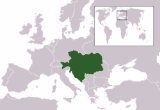
Economy of the Habsburg Monarchy
Encyclopedia
With the abolition of serfdom in the 18th century, the Habsburg Monarchy
, with the major industrial, mining areas and forestry of regions Moravia
and Bohemia
leading the way, began to experience unprecedented economic growth. Beginning in 1841 per capita annual growth in the Habsburg monarchy approached 3.6 percent, a number rivaling that of neighboring Germany. While this growth was rapid and astonishing, it was not sustained.
Within the next decade, a period of stagnation occurred, while other European countries began to experience a continued, steady growth. This slow down can be accredited, for the most part, to a period of ongoing war, beginning in 1848 and ending in 1866 with the Habsburgs defeat by Prussia
. This period of war, and a mounting budget deficit, took resources away from private industry, which discouraged industrial growth. This factor eventually brought the economy to a halt in the years after 1855.
The Habsburg’s wars in the mid 19th century caused a considerable Economic backwardness through the rest of the 19th century. As other European economies had grown from the 1850’s on, the Habsburgs had shrunk, a consequence of the Habsburgs continuing wars and Eastern Europe’s continuing neutrality.
Habsburg Monarchy
The Habsburg Monarchy covered the territories ruled by the junior Austrian branch of the House of Habsburg , and then by the successor House of Habsburg-Lorraine , between 1526 and 1867/1918. The Imperial capital was Vienna, except from 1583 to 1611, when it was moved to Prague...
, with the major industrial, mining areas and forestry of regions Moravia
Moravia
Moravia is a historical region in Central Europe in the east of the Czech Republic, and one of the former Czech lands, together with Bohemia and Silesia. It takes its name from the Morava River which rises in the northwest of the region...
and Bohemia
Bohemia
Bohemia is a historical region in central Europe, occupying the western two-thirds of the traditional Czech Lands. It is located in the contemporary Czech Republic with its capital in Prague...
leading the way, began to experience unprecedented economic growth. Beginning in 1841 per capita annual growth in the Habsburg monarchy approached 3.6 percent, a number rivaling that of neighboring Germany. While this growth was rapid and astonishing, it was not sustained.
Within the next decade, a period of stagnation occurred, while other European countries began to experience a continued, steady growth. This slow down can be accredited, for the most part, to a period of ongoing war, beginning in 1848 and ending in 1866 with the Habsburgs defeat by Prussia
Prussia
Prussia was a German kingdom and historic state originating out of the Duchy of Prussia and the Margraviate of Brandenburg. For centuries, the House of Hohenzollern ruled Prussia, successfully expanding its size by way of an unusually well-organized and effective army. Prussia shaped the history...
. This period of war, and a mounting budget deficit, took resources away from private industry, which discouraged industrial growth. This factor eventually brought the economy to a halt in the years after 1855.
The Habsburg’s wars in the mid 19th century caused a considerable Economic backwardness through the rest of the 19th century. As other European economies had grown from the 1850’s on, the Habsburgs had shrunk, a consequence of the Habsburgs continuing wars and Eastern Europe’s continuing neutrality.

